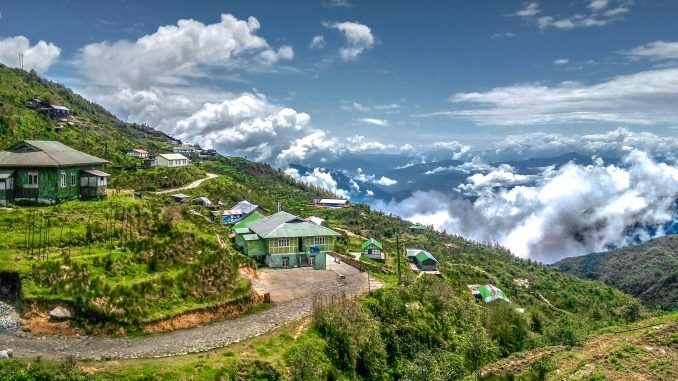
By Navneet Anand
At a time when India has the dubious distinction of being a laggard in nurturing the environment, we should emulate the tiny State of Sikkim
This is one feat we could do without. A report, ‘The World Population Prospects: The 2017 Revision, released by the Department of Economic and Social Affairs, United Nations, estimated that by 2024, India could surpass China as the most populous country. While India’s current population is estimated at 1.34 billion people, China is at the top with 1.41 billion people. On the contrary, our record on the environment front is not so good. According to a biennial report, ‘Environmental Performance Index 2018’ by Yale and Columbia universities along with the World Economic Forum, India ranks 177 among 180 countries in Environmental Performance Index. India’s poor performance in the environmental health category is a cause for worry.
It is distressing that Delhi has earned the unenviable distinction of being one of the most polluted cities on earth, with perpetually worsening air quality. The scary smog that envelops the National Capital Region and chokes people’s lungs is still fresh in memory. As hapless citizens look to the State to address such grave dangers, there have been instances where people have organised themselves to demonstrate their angst and anxiety. Delhiites displayed a rare surge in sentiments when recently, they organised themselves to protest against the ruthless felling of trees for road construction. But Delhi is not alone in this notoriety. All across the country, environmental degradation has shown a rare uniformity. But Sikkim offers a rare reprieve from this scary consistency and is worth emulation.
The tiny State, nestled in the Himalayan foothills in the North-East, has been driving a green revolution of its own kind. Despite being small and isolated, and with its people leading their lives in extremely tough mountainous terrain, Sikkim has emerged as one of India’s environmental leaders. It’s probably the only State that has witnessed afforestation. Due to sustainable environmental policies and novel initiatives, forest cover has increased by about four per cent in the last 25 years.
Sikkim is a State with many firsts when it comes to green policies. It is the first Indian State which is fully organic. It is also India’s first State to ban open defecation and plastic use. It has come out with novel initiatives like ‘Mitini’ and ‘Ten Minutes to Earth’, which were implemented and are being followed for over a decade now. Sikkim is the only State which is open defecation free today. Urinating in public can attract a fine of up to Rs 500. The Government made it mandatory to have a toilet at home. The State even banned firecrackers in 2014 to contain noise and air pollution.
Sikkim has not only introduced policies to remain India’s cleanest and greenest State but has initiated novel initiatives, like Mitini to forge amity between people and trees. Sikkimese can adopt trees and get into a relationship of brotherhood or sisterhood with trees. This kind of initiatives has brought a sense of preserving the environment at the grass-root level.
The Environment Policy of Sikkim states that the State shall endeavour to protect and improve the environment, to safeguard the forests and wildlife and to protect and improve the natural environment, including forests, lakes, rivers and wildlife and to have compassion for the living creatures. More than 80 per cent of the land resources of the State is under the management of the Department of Forests, Environment and Wildlife. Sikkim’s forest cover has increased from 44 per cent to 47 per cent at a time when most States are struggling to protect their existing forest covers.
“Our movement to make Sikkim a complete green State will be pursued till we reach our goal. We aim to give Sikkim a unique identity as a natural university of the world,” pledged the current Government.
In January 2016, Sikkim gained global attention when Prime Minister Narendra Modi declared it as India’s first fully organic State. Nearly 15 years ago, the State Government had decided to shun chemical pesticides and fertilisers and return to natural methods of farming. Today, Sikkim has the distinction of becoming the first State in India to go 100 per cent organic, but achieving this feat was an uphill task.
Sikkim’s Chief Minister, Pawan Chamling, who is also often referred to as the greenest Chief Minister, announced a slew of measures to further support the cause of organic farming. In order to encourage organic farmers and to ensure the success of the organic mission, the State recently announced transport subsidy, goods compensation, crop insurance and price support among other incentives to organic farmers of the state over the next five years. The longest serving Chief Minister in the country, Chamling was also honoured for his pioneering work in the field of organic farming during a ceremony at Germany’s Lagau on the occasion of the One World Festival last year. At the time when there have been rising concerns about life-threatening hazards, Sikkim has to lead the way towards preserving the environment. Chamling once said, “Development is impossible without the protection of the environment and a democratic atmosphere.” It’s time other States take a leaf out of this and emulate Sikkim.
Source: Daily Pioneer

Leave a Reply